|
|
|
Sort Order |
|
|
|
Items / Page
|
|
|
|
|
|
|
| Srl | Item |
| 1 |
ID:
131435
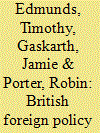

|
|
|
|
|
| Publication |
2014.
|
| Summary/Abstract |
In July 2013, Chatham House hosted a workshop under the auspices of the Global Insecurities Centre of the University of Bristol and the British Foreign Policy Working Group of the British International Studies Association, to explore these challenges. Four of the papers presented at that conference have been chosen for this special selection.
|
|
|
|
|
|
|
|
|
|
|
|
|
|
|
|
| 2 |
ID:
131444
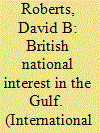

|
|
|
|
|
| Publication |
2014.
|
| Summary/Abstract |
The British government is in the process of re-energizing its relations with the Gulf states. A new Gulf strategy involving a range of activities including more frequent elite bilateral visits and proposals sometimes touted as Britain's military 'return to east of Suez' are two key elements of the overarching strategy. Such polices are designed to fall in line with British national interest as identified by the government-authored 2010 National Security Strategy (NSS), which emphasizes the importance of security, trade, and promoting and expanding British values and influence as perennial British raisons d'etat. In the short term, the Gulf initiatives reflect and compliment these core interests, partly based on Britain's historical role in the region, but mostly thanks to modern day trade interdependencies and mutually beneficial security-based cooperation. However, there is yet to emerge a coherent understanding of Britain's longer-term national interest in the region. Instead, government-led, party-political priorities, at the expense of thorough apolitical analysis of long-term interests, appear to be unduly influential on the origins of both the Gulf proposals and the NSS conclusions themselves. Without a clear strategic, neutral grounding, both the Gulf prioritization and the NSS itself are weakened and their longevity undermined.
|
|
|
|
|
|
|
|
|
|
|
|
|
|
|
|
| 3 |
ID:
131437
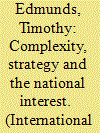

|
|
|
|
|
| Publication |
2014.
|
| Summary/Abstract |
British strategy-making has been subject to a sustained critique in recent years, from parliamentarians, retired members of the armed forces and scholars of strategic studies. This article examines the nature of this critique and the evolving character of strategic practice in Britain. It argues that the criticisms of British strategymaking are often misplaced, for two main reasons. First, many base their critique on a reductionist notion of unitary 'national interest' that fails to capture systemic patterns of complexity and contestation in the wider security environment and in Britain. Second, they underestimate or ignore the extent to which the UK strategic community is itself innovating in response to these themes, particularly since the 2010 Strategic Defence and Security Review. This is not to argue that considerable challenges do not remain for strategy-making in Britain. Most notably, these include: how to translate strategic innovation in departments and elsewhere into a coherent national strategic agenda; how to do this while maintaining institutional coordination and a shared sense of strategic purpose across government (and beyond); how to sustain and consolidate institutional expertise and experience in a rapidly changing civil service and at a time of continuing public austerity; and how to articulate and legitimate security policy decisions among a general public that is both disengaged from elite strategic discourse and sceptical of the efficacy of military force. Even so, the article concludes by arguing that it is possible to see the outline of an emergent and distinctive theory of action in contemporary British strategic practice, characterized by principles of adaptivity, anticipation, self-organisation and nascent cross-governmentalism.
|
|
|
|
|
|
|
|
|
|
|
|
|
|
|
|
| 4 |
ID:
131442
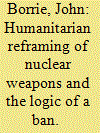

|
|
|
|
|
| Publication |
2014.
|
| Summary/Abstract |
The achievement of past international treaties prohibiting anti-personnel mines and cluster munitions showed that unpropitious political situations for dealing with the effects of problematic weapons could be transformed into concrete, legally binding actions through humanitarian-inspired initiatives. Although there is now renewed concern about the humanitarian consequences of nuclear weapons, some policy makers dispute the relevance of these past processes. This article examines how and why cluster munitions became widely reframed as unacceptable weapons, and the nature and significance of functional similarities with contemporary efforts of civil society activists to instigate humanitarian reframing of nuclear weapons and promote the logic of a ban treaty in view of its norm-setting value among states. In the case of cluster munitions, the weapon in question was signified as unacceptable in moral and humanitarian law terms because of its pattern of harm to civilians with reference to demonstrable evidence of the consequences of use. Ideational reframing was instigated by civil society actors, and introduced doubts into the minds of some policy-makers about weapons they had previously considered as unproblematic. This is relevant to the current discourse on managing and eliminating nuclear weapons in the Nuclear Non-Proliferation Treaty, in which there is dissonance between the rhetoric of those states claiming to be responsible humanitarian powers and their continued dependence on nuclear weapons despite questions about the utility or acceptability of these arms.
|
|
|
|
|
|
|
|
|
|
|
|
|
|
|
|
| 5 |
ID:
131440
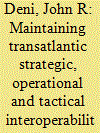

|
|
|
|
|
| Publication |
2014.
|
| Summary/Abstract |
With the end of major combat operations in Afghanistan, how will the North Atlantic alliance maintain the unprecedented levels of interoperability developed over the last decade? One of the most effective means of building and maintaining interoperability-the forward-based presence of US military forces in Europe- has shrunk significantly over the last 25 years and is likely to shrink further in the coming years, meaning it will become increasingly difficult for American and European military forces to operate side by side. Nevertheless, the United States continues to look to its allies in NATO as the primary partners in maintaining and promoting common interests around the globe. Additionally, Washington seems more committed than ever to wielding force in a coalition context. In order to help remedy this seeming incongruity, Washington announced in early 2012 a plan to deploy rotationally several hundred troops from the United States to Germany for periodic exercises with European partners and allies. However, it remains unclear whether a rotational model will be sufficient to generate the level of interoperability necessary for US forces and those of its most capable European allies to work seamlessly across the range of military operations. The loss of tactical and operational interoperability threatens transatlantic strategic interoperability, and therefore risks decoupling European and American security policy. To mitigate these challenges, the article discusses several policy steps the United States should consider.
|
|
|
|
|
|
|
|
|
|
|
|
|
|
|
|
| 6 |
ID:
131445
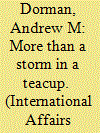

|
|
|
|
|
| Publication |
2014.
|
| Summary/Abstract |
In September 2014 the people of Scotland will vote on whether to become an independent nation, with the defence and security of Scotland proving to be one of the more vociferous areas of debate. This article argues that defence and security implications of this referendum are far more fundamental than either the 'yes' or 'no' campaigns have admitted. It makes four points. First, it suggests that the Scottish government's plans for defence and security in NATO and the EU are at odds with its proposed armed forces and that Scotland may well find itself having to make far greater commitments to defence to assure its allies. Second, it argues that a vote for independence will represent a game-changing event for the remainder of the United Kingdom's defence and security, which will have significant consequences for the United Kingdom's partners and allies in NATO, the European Union and elsewhere. Third, the article contends that even a vote against independence will have a long-term impact, in that the 'West Lothian question' and Scottish support for nuclear disarmament influence the 2015 Strategic Defence and Security Review. Finally, the article highlights how this issue has revealed weaknesses in the think-tank and academic communities, particularly in Scotland. The independence vote does, therefore, represent 'more than a storm in a tea cup' and thus there needs to be far greater engagement with these issues within the United Kingdom and elsewhere
|
|
|
|
|
|
|
|
|
|
|
|
|
|
|
|
| 7 |
ID:
131436
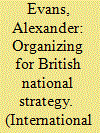

|
|
|
|
|
| Publication |
2014.
|
| Summary/Abstract |
In December 1968 Ernest May asked how the US government could gain access to 'long-headed' staffers to provide greater strategic depth to foreign policy. The challenge of long-term strategy persists: how should government be organized to support it, how can the right people be found to staff it and how can political leaders make time for longer-term policy-making given the challenge of the immediate? The policy planning staff in the Foreign and Commonwealth Office have traditionally had the task of supporting longer-range, broader foreign policy. A small group of diplomats-later leavened by externals from the media, non-profit and private sectors-was meant to generate an improved approach to British interests and policy. As Robert Wade-Gery recalls of its role in the 1960s, there was a push to forge fresh links with outside thinking. Did it work? Former policy planners can be circumspect about its achievements. One former British planner said he felt like 'a spare part rattling around in a tin', while former American planners have written about the challenge of injecting fresh thinking when detached from decision-making. Other planners were dragged into operational work or speechwriting. Many planners nonetheless enjoyed the opportunity to think more broadly. Policy planning can be intellectually rich without being the source of actionable strategic thinking about the long-term national interest. This article suggests that a greater focus on people rather than systems might help to foster more strategic, anticipatory and innovative thinking about the national interest.
|
|
|
|
|
|
|
|
|
|
|
|
|
|
|
|
| 8 |
ID:
131443
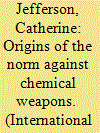

|
|
|
|
|
| Publication |
2014.
|
| Summary/Abstract |
The use of chemical weapons in Syria in August 2013 led to calls for a tough international response in order to uphold the norm against what is often portrayed as a particularly odious form of warfare. The condemnation of poison weapons has a long history and this article examines the origins of the international norm against their use. It focuses particularly on the proceedings of the first Hague Peace Conference and suggests that this represented the emergence of an important distinction between the customary norm against poison and poisoned arms, and a newly codified norm against the use of asphyxiating gas projectiles, which was primarily an attempt to limit the potential of new weapons technologies. However, psychological responses to the wide-scale use of chemical weapons in the First World War underscored a deep revulsion to this form of warfare and blurred the distinction between gas projectiles and poison. While the Hague Conventions ultimately failed to avert the use of chemical weapons, the formation of the 1925 Geneva Protocol reaffirmed the norm against the use of poison in war and represented both a legal and moral condemnation of chemical and biological weapons that continues to be enshrined in international law today.
|
|
|
|
|
|
|
|
|
|
|
|
|
|
|
|
| 9 |
ID:
131439
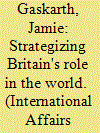

|
|
|
|
|
| Publication |
2014.
|
| Summary/Abstract |
In recent commentaries on British foreign policy, the New Labour and coalition governments have been criticized for lacking strategic thinking. Academics describe a 'strategy gap' and note that old ideas about Britain's role in the world, such as Churchill's 1948 reference to 'three circles', continue to be recycled. Parliamentarians bemoan the 'uncritical acceptance of these assumptions' that has led to 'a waning of our interests in, and ability to make, National Strategy'. This article argues that a primary problem has been the lack of consideration of how identity, strategy and action interrelate in foreign policy. Using the insights of role theory, the article seeks to address this by outlining six ideal-type role orientations that the UK might fulfil in world politics, namely: isolate, influential (rule of law state), regional partner, thought leader, opportunist-interventionist power and Great Power. By considering how variations in a state's disposition towards the external environment translate into different policy directions, the article aims both to highlight the range of roles available to policy-makers and to emphasize that policy often involves making a choice between them. Failure to recognize this has resulted in role conflicts and policy confusion. In setting out a variety of different role orientations, the author offers a route to introducing a genuine strategic sensibility to policy-making, one that links identity with policy goals and outcomes.
|
|
|
|
|
|
|
|
|
|
|
|
|
|
|
|
| 10 |
ID:
131438
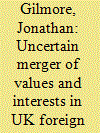

|
|
|
|
|
| Publication |
2014.
|
| Summary/Abstract |
How should ethics and values relate to the British national interest? The idea that ethical commitments to distant non-citizens should occupy a position within British foreign policy was a controversial element of Labour's foreign policy during the early part of their 1997-2010 tenure. Rather than undermining traditional national interest concerns, one of the defining themes within Labour's foreign policy was that values and national interests were becoming increasingly merged in a globalized world. The post-2010 coalition government has made distinct efforts to differentiate themselves from their predecessors, crafting a more pragmatic and national interest-based foreign policy approach. Despite this, significant continuities with Labour's 'ethical dimension' are evident and many associated policies and practices have survived the transition. Moreover, the suggestion that British values and interests are interrelated and mutually reinforcing has been re-asserted, with renewed vigour, by coalition policy-makers. The article traces the ways in which values and interests have become increasingly merged in the language of recent British foreign policy and examines the implications for our understanding of the UK's national interest. It argues that the idea of an almost symbiotic relationship between values and interests is fundamentally unhelpful and makes the case for greater disaggregation of the two. Although a zero-sum game need not exist between core national interests and ethical obligations abroad, the suggestion that they are mutually reinforcing obscures the tensions that frequently arise between these different realms of obligation. Using the examples of failed state stabilization and UK arms trade regulation, the article demonstrates how uncritical acceptance of the values-interests merger risks producing unstable policy formulations.
|
|
|
|
|
|
|
|
|
|
|
|
|
|
|
|
| 11 |
ID:
131441
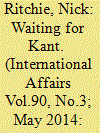

|
|
|
|
|
| Publication |
2014.
|
| Summary/Abstract |
Expectations of significant progress towards a nuclear weapons-free world continue to shape global nuclear politics. Progress towards nuclear disarmament will require diminishing the value of nuclear weapons to the point where it becomes politically, strategically and socially acceptable for nuclear-armed states to relinquish permanently their nuclear arsenals. Key to this are the concepts and processes of 'devaluing' and 'delegitimizing' nuclear weapons that have steadily coalesced in global nuclear discourse since the mid-1990s. This article builds on current research by developing three images of nuclear disarmament under the Nuclear Non-Proliferation Treaty (NPT): 'surface' devaluing, 'deep' devaluing, and delegitimizing nuclear weapons. The first represents codification by the nuclear-weapon states of the transformation of the Cold War environment through reductions in the size and role of nuclear arsenals that leaves the logic of nuclear deterrence and nuclear prestige largely unchanged. Deep devaluing is framed as a reconceptualization of the political, strategic and military logics that underpin nuclear-weapons policies and practices. Delegitimizing represents a more radical normative project to transform collective meanings assigned to nuclear weapons. The analysis examines conceptions of devaluing nuclear weapons from the perspective of non-nuclear weapon states and the relationship between devaluing nuclear weapons and the idea of a spectrum of nuclear deterrence. It concludes by highlighting the tension between surface and deep devaluing, the emergence of a delegitimizing agenda, and the political implications for the current NPT review cycle set to culminate in the next quinquennial Review Conference in 2015.
|
|
|
|
|
|
|
|
|
|
|
|
|
|
|
|
|
|
|
|
|